Page Content 2018-09 eiNewsletter Newsletters Profile Page Joint Newsletter of the Networks e+i and A&FS Joint Newsletter of the Networks e+i and A&FS 
Dear members of the e+i and the A&FS network,
We are very happy to present you with this year's september edition of our joint newsletter and wish you good reading.
Peter Beez Ueli Mauderli
Focal Point e+i Focal Point A+FS
e+i Reminder: Support by external experts
SDC e+i network members can use various experts up to one day of work (no bureaucracy, just inform the FP e+i) for thematic support such as commenting on documents like TORs, webinar on approaches and methodologies, brief literature overview on a certain topic, etc. If you need more time, ask ahead, maybe it is of general interest for the network: Support PSD / FSD Support VSD Katrin OchsenbeinRegional Advisor E+I Western Balkans, Pristina What do you love about your work, what is special about it? Until recently I have worked for SECO headquarters, so I come to the field with a fresh and open mind. I am looking forward to receiving a lot of stimulating inputs on how development cooperation works in practice. I am particularly excited about being closer to discussions on the ground and being able to observe the application of various tools in different realities. As the regional advisor for E+I, I am privileged to get a closer look on SDC’s work in the different Western Balkan countries, which allows me to learn about different experiences as to what has worked well and what not. It is an honour for me to be part of these discussions and contribute to efficiency gains by encouraging the sharing of experiences, lessons learnt and ideas among the different cooperation offices in the Western Balkans and within SDC in general.
Which is/are your favourite instrument(s)? Many of our projects use the market systems development (MSD) approach or at least apply some tools from this methodology. Within the vast array of tools the MSD approach offers, the sustainability matrix strikes me as particularly important. By answering the questions “who does and who pays” as well as the questions “who will do and who will pay”, the sustainability matrix provides a simple framework for a common vision as to how the situation should look like beyond the support provided by a project. It is of particular importance to get the buy-in of the relevant sector stakeholders at the beginning, as they will be an important part of the sustainability strategy.
Your message for your colleagues? Sometimes, especially when doing the same thing for a long time, one gets used to a certain way of doing. It is always good, if we challenge ourselves to stay open to innovative ideas, look for new effective and efficient solutions and to be interested in new topics that emerge in discussions. Therefore, make use of the variety of support that SDC is providing through its E+I network - be it the backstoppers, the e-discussions and e-talks or the regional advisors.
 22 Aug 2018 
Co-created by the Swiss Agency for Development and
Cooperation and Roots of Impact SIINC is a funding instrument that rewards
high-impact enterprises with premium payments for achieving verified social
outcomes. The additional revenues enable enterprises to improve profitability
and attract investment to scale. Thus, SIINC can effectively leverage public or
philanthropic funds and catalyse private investment in underserved markets with
a high potential for social impact. Clínicas del Azúcar is one of the first
social enterprise cases within the SIINC program in Latin America and the Caribbean,
launched by the SDC, Roots of Impact, the Inter-American Development Bank
(IDB), New Ventures and Ashoka in 2015.
The outcomes of the first period proof the success of this
strategy for Clínicas del Azúcar and most importantly its clients at the
base of the pyramid. For the first time in their life they are able to access
affordable and qualitative treatment for diabetes. At the same time, Clínicas
del Azúcar is able to scale up its services to 200 (!) clinics in Mexico.
Read more on this promising achievements, Clínicas del
Azúcar and SIINC here.
 28 Aug 2018
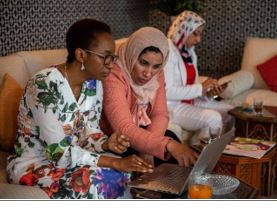
The Swiss Capacity Building Facility (SCBF) is a unique non-profit association that fosters income and employment generation through financial inclusion in emerging and developing countries. The SCBF assists financial institutions in significantly scaling up their outreach to poor people, with a clear social mission to serve women and rural areas, smallholder farmers, as well as micro- and small enterprises.
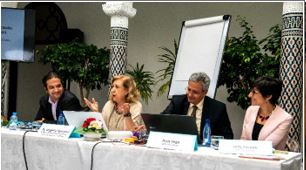
Another focus of the SCBF is financial education for low-income people. To facilitate knowledge exchange among SCBF partners on innovative, digital financial education methodologies and tools, the
SCBF organized a two-day workshop in June, at the residence of the Swiss Ambassador in
Rabat, Morocco. Discussion points were digital prototypes of financial education tools, like e-learning platforms and gaming apps, that can be fine-tuned by different actors according to local socio-cultural conditions.
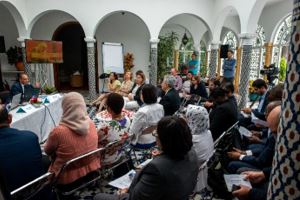
The workshop was organized to showcase the work of different financial institutions, which presented their current financial education business strategy, digital tools and lessons learnt. Prototypes of e-learning platforms and app-based financial education games were presented. On the second day, the focus was on how to go forward in financial education and on global evolving trends and innovations in the delivery of effective financial education. Thereby, the related key success factors and challenges from a human resources viewpoint where discussed. The rest of the workshop was driven by different working-groups exchanging know-how and expertise. Finally, and most importantly for SCBF, participants identified ways in which SCBF can best facilitate technical support and knowledge exchange.
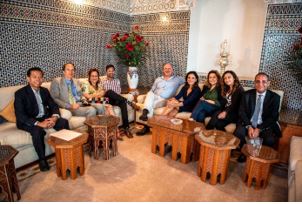
The first lesson learned from the workshop highlighted the importance of finding the right partnerships to grow from the very beginning and having a strategic vision focused on consistency and long-term sustainability. Further, financial education should be a continuous engagement with clients and, critically, education should be fun! The best way to expand the financial education outreach is to use digital channels, comics and games. And finally, local language is key and must be adapted to real life in the local context (e.g. local Arabic vs classical Arabic).
The full workshop material, including slides, pictures and videos are soon available on the SCBF website.
 22 Aug 2018 
Co-created by the Swiss Agency for Development and
Cooperation and Roots of Impact SIINC is a funding instrument that rewards
high-impact enterprises with premium payments for achieving verified social
outcomes. The additional revenues enable enterprises to improve profitability
and attract investment to scale. Thus, SIINC can effectively leverage public or
philanthropic funds and catalyse private investment in underserved markets with
a high potential for social impact. Clínicas del Azúcar is one of the first
social enterprise cases within the SIINC program in Latin America and the Caribbean,
launched by the SDC, Roots of Impact, the Inter-American Development Bank
(IDB), New Ventures and Ashoka in 2015.
The outcomes of the first period proof the success of this
strategy for Clínicas del Azúcar and most importantly its clients at the
base of the pyramid. For the first time in their life they are able to access
affordable and qualitative treatment for diabetes. At the same time, Clínicas
del Azúcar is able to scale up its services to 200 (!) clinics in Mexico.
Read more on this promising achievements, Clínicas del
Azúcar and SIINC here.
 10 Sep 2018  10 Sep 2018  In Romania the trend is to go to university. The political and economic transition has had consequences which, coupled with this trend, explain the shortage of properly skilled professionals in the labour market. The "Job Orientation Training in Businesses and Schools (JOBS)" programme bridges the school environment and the labour market. It aims at preparing pupils in the last year of traditional high school and those in the first year of the technical section of middle school, to better identify their competencies and to familiarise them with the reality of the labour market. The goal is to provide them with information about professional opportunities in order to increase their chances of finding a vocational training course that suits them. A blog entry summarizes what the project has achieved... [more] Further information about the project: See the project's record in our e+i Portfolio Database here (members only). The record in the FDFA database is here.
 03 Sep 2018 In spring 2014 SDC launched the Vocational Skills Development Program (VSDP) in Myanmar, implemented by a consortium of Swisscontact (lead) and INBAS. During the four years of its Phase 1 VSDP delivered significant results. SDC therefore renewed its contract for the implementation of a second phase of VSDP that was launched on the 1st of May 2018. The second phase will fine-tune and scale up the activities developed under phase 1; additionally it will embark on pilot activities in the field of (dual) apprenticeship training. The results of phase 1 are briefly summarized in a powerpoint presentation... [see the presentation] Further information about the project: See the project's record in our e+i Portfolio Database here (members only). The record in the FDFA database is here.
 03 Sep 2018 In line with the newly endorsed Tanzanian National Skills Development Strategy (NSDS), the Swiss Agency for Development and Cooperation SDC launched the Skills for Employment Tanzania (SET) programme. The factsheet summarises the project's actvities and goals... [more] Further information about the project: See the project's record in our e+i Portfolio Database here (members only). The record in the FDFA database is here.
 27 Aug 2018 The team behind the SDC’s Skill for Jobs Programme in Albania explains how they help youngsters during the transition from school to work in a blog post … [more] Further information about the project: See the project's record in our e+i Portfolio Database here (members only). The record in the FDFA database is here.
 27 Aug 2018 With Job Clubs, the YEP project substantially altered the support for youngsters entering the labour market in Bosnia and Herzegovina. More than 3000 participants have found employment and more than 25 Employment Services adopted the approach. Our next e-talk will therefore have a closer look at the project. Since the number of participants of the e-talks is limited, we have prepared a brief summary available to everyone...[read more] Further information about the project: See the project's entry in our e+i Portfolio Database here (members only). The project's entry in the public database is here. Read the factsheet here. In 2017, the project has been selected as a success story among more than 250 participants and participated in the 13th Annual Meeting of the OECD LEED Forum on Partnerships and Local Development. e-talk: An upcoming e-talk will focus on YEP. Learn more about it here.  06 Aug 2018 PROMOST’s goal is to contribute to increased employment and
income generation for the rural population in the Great Lakes Region by
improving their access to quality and labour market oriented vocational
training. The reform of the Technical and Vocational Education and Training
(TVET) system plays a crucial role in achieving the Great Lakes’ target of
overcoming poverty. The project is financed by the Swiss Agency for Development
and Cooperation (SDC) and implemented by Swisscontact… [more] Further information about the project: See the project's record in our e+i Portfolio Database here (members only). Swisscontact shares everything about the project here. [Photo provided by Swisscontact]
 03 Aug 2018 In July, the President of the Swiss Confederation, Alain Berset, visited the Skills4Life project in Kenya. The project is funded by the SDC and implemented by Swisscontact. The approach of the project is strongly focused on the local market opportunities and enabling the trainees to immediately generate income out of the skills acquired. Read more about the visit on the Swisscontact website here or listen to the radiobroadcast about the visit here (german only). In addition, Swisscontact has produced a feature about the project here. Further information about the project: Watch a video about the project here. Read how the project uses TEL here. See the project's record in our e+i Portfolio Database here (members only). Swisscontact shares everything about the project here. [Photo provided by Swisscontact] The Market Systems Symposium's purpose is to provide the inspiration, capacity building, and connections you need to strengthen and transform your market systems development practice. Join leading experts, practitioners and donors from around the globe to move forward conversations that explore innovations in research and the application of market systems development strategies, through inspiring dialogues, capacity building breakouts, hands-on tool workshops, and tons of networking. >> more This 5-days course offers a comprehensive and in-depth understanding of all aspects that practitioners need to set up a practical results measurement system for internal learning and communicating credible results. This course targets intervention and results measurement staff and managers who are working in Private Sector Development programs. >> more The Programme focuses on how to make development more effective, achieving greater impact, inclusiveness, scale and sustainability. It explores the strategic and practical implications for organisations as they adopt the market systems development approach. The programme builds on nearly two decades of the Springfield Centre’s experience in offering training on the market systems development approach (also known as ‘Making Markets Work for the Poor’ or ‘M4P’) >> moresave the date! for more information >> hereMaking Cents International's Global Youth Economic Opportunities Summit is a global convening that brings together 500+ leading stakeholders from 55 countries to connect, exchange, and collaborate. Changemakers, innovators, and leading technical experts join the Summit to increase the impact, scale, and sustainability of youth economic opportunities programming, policies, and partnerships around the globe. Participants strengthen partnerships, improve technical capacity, and expand awareness of current and emerging approaches in youth development. >> moreOur next Savings and Credit Forum will be organized together with the Gender Network:
SDC's Focal Points on Employment and Income (e+i) and Gender have come together to organize this Forum on Women's Financial Inclusion. This event is part of the capitalization process the two Focal Points started in early 2018 to gather experiences of SDC on this topic. >> more information will be posted here in due time
Making Cents International's Global Youth Economic Opportunities Summit is a global convening that brings together 500+ leading stakeholders from 55 countries to connect, exchange, and collaborate. Changemakers, innovators, and leading technical experts join the Summit to increase the impact, scale, and sustainability of youth economic opportunities programming, policies, and partnerships around the globe. Participants strengthen partnerships, improve technical capacity, and expand awareness of current and emerging approaches in youth development. >> moreOur next Savings and Credit Forum will be organized together with the Gender Network:
SDC's Focal Points on Employment and Income (e+i) and Gender have come together to organize this Forum on Women's Financial Inclusion. This event is part of the capitalization process the two Focal Points started in early 2018 to gather experiences of SDC on this topic. >> more information will be posted here in due time
VSD projects and programmes may serve different purposes and pursue diverse objectives. In order to structure the landscape of possible VSD interventions, the e+i Focal Point has developed a series of Project Typology Tools. Through a Webinar (on 12 November 2018 at 11am CET) and a subsequent E-discussion (12 to 16 November 2018) these tools shall be validated and possible applications and case studies presented and discussed. More information will be provided towards the end of October on the Shareweb and the DGroup mailing list of e+i VSD community. We are looking forward to read your thoughts. The Webinar will be presented in English language. Nevertheless, French
and Spanish speakers’ contributions are most welcomed in the e-discussions.
Learn more about previous e-discussions in our event archive here. Following a systematic overview of the key labour market challenges in developing countries, the focus of the course will be on the basic concepts of employment promotion and specific approaches surrounding labour market policy. Precisely, you will learn about the relevance and impact of employment in the development context, trends and special features of labour markets in developing countries (incl. informal sector), theoretical models and classification of different types of unemployment, active labour market policy and employment promotion (incl. youth employment promotion), and employment promotion in the context of conflict, fragility and violence... [ more]
The European Training Foundation (ETF) is organising a conference in Turin on 21-22 November 2018, entitled "Skills for the future: managing transition" to explore how developing and transition countries can respond to the challenges of current global trends from a skills perspective. How do global forces interact with local realities and how does this affect the need for skills? How should governments, businesses, social partners, civil society, research institutions, communities and education and training providers work together to manage change? What skills policies work in different contexts?
Participants will identify ways to develop forward-looking training and labour policies in their countries, and will have the opportunity to share their views and work together to identify how the EU can support this transition through the work of the ETF... [ more] The Summer Institute is CEMETS’ annual flagship project on Economic Policy Development for Educational Reform Leaders. Participants revise and strengthen their reform plans through a combination of site visits, lectures from leading researchers, input from top practitioners, and collaborating on others’ reform case studies. Alumni stay in touch with CEMETS through ongoing support and continuous research participation. Alumni stay in touch with CEMETS through ongoing support and continuous research participation... [more]
In 2017, the SDC sent four teams—from Benin, Costa Rica, Chile, and Nepal. If you consider participating in the CEMETS Summer Institute, have a look at what last year participants have to say about the Summer Institute here. Deadline for application: 01 March 2019
Gender inequality and discrimination are still a reality and a great challenge, in Switzerland and worldwide. More than 70% of the people affected by poverty worldwide are women and often have no access to education at all. At the same time, it has been clearly demonstrated that education for women has enormous positive effects on family, society and the economy.
At the annual event, we ask about good policies, strategies and experiences in favour of girls and women in vocational education and training and present possible ways forward. Registration: till November 11, 2018 / Language: German / Time: 2pm - 5pm / More information: here.
The course discusses underlying principles, general guidelines and different approaches to identify adequate financing mechanisms for sustainable skills development and TVET systems... [more] Deadline for application: 01 October 2018
 03 Sep 2018
Here is what has happened so far:
(1) As mentioned in a previous newsletter, a CAPEX of this topic has started at the beginning of this year, (2) 50 projects were gathered, analysed and clustered in gender responsive / sensitive categories. (3) 10 e-consultations were held with the most gender responsive women’s financial inclusion projects and, (4) a webinar and an e-discussion were held from the 4th to the 6th of September. (5) The slides of the webinar and the summary of the e-discussion will be shared soon!
 30 Aug 2018 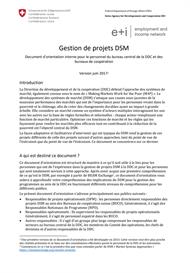
This internal guidance provides advice for SDC staff and the wider community on how to manage projects using a market systems approach. It provides advice on staff activities throughout the project cycle, i.e. from the development of an initial project idea to the evaluation and preparation of a follow-up phase and includes concrete guidance on good practice, and voices and experiences from the field.
The guidance document is structured in such a way that it is both useful for people with and without experience in managing portfolios of MSD projects in SDC, as well as for people from development agencies who design and manage projects, and for professionals interested in learning more about the processes.
********************** FRANCAIS **********************
Le réseau e+i a publié en 2017 une version révisée du document d'orientation interne sur la gestion des projets DSM. Les réactions au document ont été très positives, de sorte que le point focal a décidé de traduire le document en français et en espagnol.
Ce guide interne fournit des conseils au personnel de la DDC et à l'ensemble de la communauté sur la manière de gérer les projets en utilisant une approche des systèmes de marché. Des conseils sont fournis sur les activités du personnel tout au long du cycle du projet, c'est-à-dire depuis l'élaboration d'une idée de projet initiale jusqu'à l'évaluation et la préparation d'une phase de suivi, et comprend des orientations concrètes sur les bonnes pratiques, ainsi que des voix et des expériences sur le terrain.
Ce document d’orientation est structuré de manière à ce qu'il soit utile pour les personnes qui ont et qui n’ont pas de l'expérience dans la gestion de projets DSM à la DDC, pour les personnes des agences de développement qui conçoivent et gèrent des projets, et pour les professionnels intéressés à en savoir plus sur les processus.
********************** ESPAÑOL **********************
La red e+i publicó una versión revisada del documento de orientación interna sobre la gestión de proyectos de DSM en 2017. Las reacciones al documento fueron muy positivas, por lo que el punto focal decidió traducir el documento al francés y al español.
Estas directrices internas orientan al personal de la COSUDE y a la comunidad en general sobre la gestión de proyectos con un enfoque de sistemas de mercado. Proporciona asesoramiento sobre las actividades del personal a lo largo de todo el ciclo del proyecto, es decir, desde el desarrollo de una idea inicial de proyecto hasta la evaluación y preparación de una fase de seguimiento e incluye una orientación concreta de buenas prácticas, y voces y experiencias del campo.
La guía está estructurada de tal manera que es útil para las personas con y sin experiencia en la gestión de carteras de proyectos DSM en la COSUDE, para las personas de las agencias de desarrollo que diseñan y gestionan proyectos y para los profesionales interesados en conocer mejor los procesos
 29 Aug 2018 SAVE THE DATE: 6 May To 9 May 2019 The Focal Points e+i and CEP kindly invite all interested SDC Staff from the thematic areas of Vocational Skills Development, Private Sector Development, Financial Sector Development as well as Engaging with the Private Sector to join us for a better understanding on engaging with the private sector in the employment and income area, by bringing together two priorities of the 2017-2020 Dispatch on International Cooperation... [more] 03 Sep 2018
Here is what has happened so far:
(1) As mentioned in a previous newsletter, a CAPEX of this topic has started at the beginning of this year, (2) 50 projects were gathered, analysed and clustered in gender responsive / sensitive categories. (3) 10 e-consultations were held with the most gender responsive women’s financial inclusion projects and, (4) a webinar and an e-discussion were held from the 4th to the 6th of September. (5) The slides of the webinar and the summary of the e-discussion will be shared soon!
 30 Aug 2018 
This internal guidance provides advice for SDC staff and the wider community on how to manage projects using a market systems approach. It provides advice on staff activities throughout the project cycle, i.e. from the development of an initial project idea to the evaluation and preparation of a follow-up phase and includes concrete guidance on good practice, and voices and experiences from the field.
The guidance document is structured in such a way that it is both useful for people with and without experience in managing portfolios of MSD projects in SDC, as well as for people from development agencies who design and manage projects, and for professionals interested in learning more about the processes.
********************** FRANCAIS **********************
Le réseau e+i a publié en 2017 une version révisée du document d'orientation interne sur la gestion des projets DSM. Les réactions au document ont été très positives, de sorte que le point focal a décidé de traduire le document en français et en espagnol.
Ce guide interne fournit des conseils au personnel de la DDC et à l'ensemble de la communauté sur la manière de gérer les projets en utilisant une approche des systèmes de marché. Des conseils sont fournis sur les activités du personnel tout au long du cycle du projet, c'est-à-dire depuis l'élaboration d'une idée de projet initiale jusqu'à l'évaluation et la préparation d'une phase de suivi, et comprend des orientations concrètes sur les bonnes pratiques, ainsi que des voix et des expériences sur le terrain.
Ce document d’orientation est structuré de manière à ce qu'il soit utile pour les personnes qui ont et qui n’ont pas de l'expérience dans la gestion de projets DSM à la DDC, pour les personnes des agences de développement qui conçoivent et gèrent des projets, et pour les professionnels intéressés à en savoir plus sur les processus.
********************** ESPAÑOL **********************
La red e+i publicó una versión revisada del documento de orientación interna sobre la gestión de proyectos de DSM en 2017. Las reacciones al documento fueron muy positivas, por lo que el punto focal decidió traducir el documento al francés y al español.
Estas directrices internas orientan al personal de la COSUDE y a la comunidad en general sobre la gestión de proyectos con un enfoque de sistemas de mercado. Proporciona asesoramiento sobre las actividades del personal a lo largo de todo el ciclo del proyecto, es decir, desde el desarrollo de una idea inicial de proyecto hasta la evaluación y preparación de una fase de seguimiento e incluye una orientación concreta de buenas prácticas, y voces y experiencias del campo.
La guía está estructurada de tal manera que es útil para las personas con y sin experiencia en la gestión de carteras de proyectos DSM en la COSUDE, para las personas de las agencias de desarrollo que diseñan y gestionan proyectos y para los profesionales interesados en conocer mejor los procesos
 29 Aug 2018 SAVE THE DATE: 6 May To 9 May 2019 The Focal Points e+i and CEP kindly invite all interested SDC Staff from the thematic areas of Vocational Skills Development, Private Sector Development, Financial Sector Development as well as Engaging with the Private Sector to join us for a better understanding on engaging with the private sector in the employment and income area, by bringing together two priorities of the 2017-2020 Dispatch on International Cooperation... [more] 04 Sep 2018 The ASEAN Secretariat together with the Government of Switzerland convened the ASEAN-Switzerland Consultation Workshop on Technical Vocational Education and Training (TVET). Three main issues emerged in almost all speeches, contributions and results of the different working groups, and were finally identified by the participants as the most relevant subjects that could be addressed in the framework of a joint ASEAN-SDC programme: Private sector involvement in TVET, Quality assurance in TVET and Reputation of TVET. A summary of the event is now available on our Shareweb... [more]  29 Aug 2018 SAVE THE DATE: 6 May To 9 May 2019 The Focal Points e+i and CEP kindly invite all interested SDC Staff from the thematic areas of Vocational Skills Development, Private Sector Development, Financial Sector Development as well as Engaging with the Private Sector to join us for a better understanding on engaging with the private sector in the employment and income area, by bringing together two priorities of the 2017-2020 Dispatch on International Cooperation... [more] Beam Exchange In 2017 BEAM Exchange made a short, jargon-free video called " An introduction to market systems development" that explains what the market systems approach is all about, how it differs from conventional aid, and how it can be used to help create widespread and lasting improvements in incomes, access to jobs, products and services for millions of people living in poverty. It was also translated to French and Spanish.
Now BEAM has made a second video, exploring the distinctive charateristics of the MSD approach in more detail.
World Bank Group The ‘Jobs M&E Toolkit’ provides a package of resources for project teams and clients. The aim is to help teams working with government counterparts with simple tools for data collection on jobs, without the burden of resource-intensive survey efforts. The toolkit contains a set of guidance on indicators for key results on jobs, data collection forms and manuals, which are tailored by beneficiary type: individuals and firms. SDC [1.9 MB] Este documento es un documento de orientación interna para el personal de la sede central y de la oficina de cooperación de la COSUDE. El documento de orientación original (entonces denominado " Managing M4P/ MSD projects") se elaboró en 2014 y tuvo una acogida muy positiva. Sin embargo, a principios de abril de 2017 se llevó a cabo una consulta electrónica dinámica sobre el documento de orientación revisado para la gestión de los proyectos de DSM en COSUDE. Los miembros de la red, tanto de la COSUDE como de las agencias implementadoras, han compartido muy activamente sus observaciones sobre el documento de orientación revisado, así como sus experiencias y mejores prácticas en la implementación de proyectos de DSM. Sus observaciones han sido incorporadas y esta es ahora la versión reestructurada, más fácil de usar y de más fácil acceso. SDC [1.9 MB] Este documento es un documento de orientación interna para el personal de la sede central y de la oficina de cooperación de la COSUDE. El documento de orientación original (entonces denominado " Managing M4P/ MSD projects") se elaboró en 2014 y tuvo una acogida muy positiva. Sin embargo, a principios de abril de 2017 se llevó a cabo una consulta electrónica dinámica sobre el documento de orientación revisado para la gestión de los proyectos de DSM en COSUDE. Los miembros de la red, tanto de la COSUDE como de las agencias implementadoras, han compartido muy activamente sus observaciones sobre el documento de orientación revisado, así como sus experiencias y mejores prácticas en la implementación de proyectos de DSM. Sus observaciones han sido incorporadas y esta es ahora la versión reestructurada, más fácil de usar y de más fácil acceso. GIZ This issue of the GIZ's periodical focuses on employment. Currently, only the german version is published... [ more] World Bank Group The ‘Jobs M&E Toolkit’ provides a package of resources for project teams and clients. The aim is to help teams working with government counterparts with simple tools for data collection on jobs, without the burden of resource-intensive survey efforts. The toolkit contains a set of guidance on indicators for key results on jobs, data collection forms and manuals, which are tailored by beneficiary type: individuals and firms. CEMETS The team from CEMETS conducted an extensive literature review on implementing VET reforms. The main conclusions are summarized in two blog posts. This is the second part... [ more] Franz Kehl, Roman Troxler, Rachel Ye-Sawadogo-KEK-CDC Consultants On behalf of the Austrian Development Agency, KEK-CDC Consultants have written a study on the status quo of dual vocational education and training in Burkina Faso. The study shall support Burkinabe partners in the development of VET provision for young people in Burkina Faso. Consequently, it provides an analysis of the dual training context in Burkina Faso and formulates possible leads to follow for the development of dual VET. It’s results may also be of interest for VET experts in other Western African countries... [ more] ETF Issue No. 42 of ETF's Live & Learn Periodical with news & views from across the ETF community. Inter alia, the issue features articles about the global outreach of the European Qualifications Framework and the financing of VET systems... [more] CEDEFOP
The report details Cedefop’s first cross-nation study of apprenticeships in the European Union. The point of departure for the study is what countries define and offer as apprenticeship training. It then applies a purposive approach to identifying the changes that apprenticeships are undergoing in practice, based on their design characteristics... [ more] KOF This brochure is helpful for everyone who want's to provide a deeper introduction into the Swiss VET system. Especially when you need to explain why the VET system enjoys a broad support from the economy, civils society and policy makers... [ more] ILO This report presents the main findings of the ILO survey on national initiatives to promote quality apprenticeships in the G20 member states. It was conducted between September and December 2017 as an ILO initiative to take stock of and widely share good practices in this area... [ more] OECD This report provides guidance on how policy makers can bolster local job creation and achieve sustainable inclusive growth, while meeting challenges such as youth unemployment, population ageing and climate change. Some of the key messages highlighted include the need to:
Creating more and better quality jobs is key to boosting growth, reducing poverty and increasing social cohesion. At the national level, job creation requires a stable macroeconomic framework coupled with structural policies that encourage innovation, skills and business development. But how can national and local policies be better aligned and tailored to specific local opportunities and challenges... [ more] World Bank The 2019 World Development Report (WDR) will study the changes impacting work across different country contexts. The report will reflect on jobs that are likely to disappear due to these forces of change, as well as new jobs that may emerge. It will consider the implications for human capital in different contexts by analysing data on human capital accumulation in school and work. The Report will also provide suggestions on how individuals, firms, society and governments can capture the opportunities this new world of work can offer... [ more] Jane Gisin, Roger Oakeley, Jelena Antic-Springfield, Veeda [2.1 MB] The private sector-responsive vocational education model piloted by the Private Sector Development programme South Serbia and its partners has received national recognition and has been introduced into the newly drafted national legislation as a basis for reform. This document analyses why the the programme is by some referred to as the « best model for tailor made dual education outside of Switzerland »... [ more]. |
